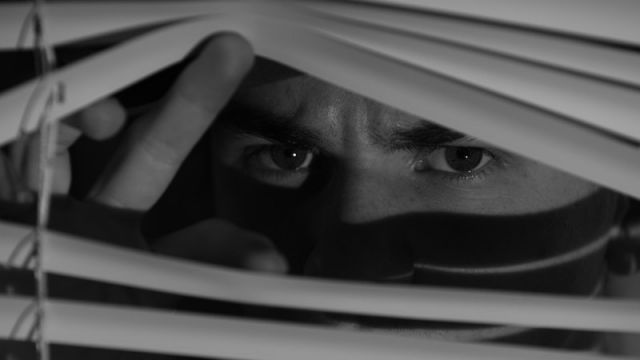One Day He Changed (and the next he was gone)
Through the haze, a dozen conversations riff from one person to another, a comment or question from one prompting a response from another. It’s a strong opening, well written and tightly performed, framing a production collectively created by the members of SAYarts and pulled together by Sophia Simmons.
When the crowd moves to the edges of the stage, revealing a Raymond Chandler-esque detective Mordecai (David Lawton) and his sidekick Smith (Milayna Ellery), we’re set up for a Noir-ish mystery as to where Colin has gone. Through interviews with his friends and others who knew him, Mordecai and Smith start to build a picture of the person, overlapping and inconsistent perspectives of someone who everyone knew of, but no-one really knew.
Lawton brings a deadpan humour to the role and is the glue that sticks the remainder together – and it works most of the time. There are wonderful subtleties in acknowledging the school hierarchy and idiosyncrasies, and some light commentary on gender roles – the irony is great when it’s the female actors trying to be macho men.

When Colin does make an appearance, in the recounting of his friends’ encounters, he is played by different actors, representing the differing perspectives from those memories. The strongest performance is his final appearance: Ethan Miotti shows enormous sensitivity when trying to decipher his ex, Duck (a sympathetic Rory Harbisher), who is trying to balance his real feelings and what others tell him he should be feeling.
Of the remainder of the large cast, Chad (Miotti) and Thad (Emma Gregory) are hilarious together; Drew (Samuel McKenna) and Cass (Charlotte O’Broin) are convincing as larger-than-life employees at a bowling alley, even when downstage of the main action. McKenna’s preacher is both funny and terrifying!
Director Alan (Alby) Grace has a large cast of differing strengths and he does well to corral them into the narrative. Lighting by Hannah Aylett and sound design by the director and Stu Nankivell helps create and support the atmosphere, without dominating the actors.

The ‘denouement’ of the detective mystery is usually the explanation of why and whodunnit, but whilst everyone has a motive and anyone could be guilty, it’s deliberately not resolved. Instead, it plays to the theme – that no-one really knows who you are, especially when you’re pretending to be someone else. The strength of that theme is inconsistent, getting buried in the heightened emotion, particularly when ineffectively conveyed though shouting or loud noise.
But this isn’t a drama written for me: it’s by, and for the teenagers, whose perception of the deeper meanings of life and their actions within it are surprising and courageous. That the production itself suffered losses due to distance and illness isn’t obvious: it’s a brave beginning of a new Australian drama from a team with such obvious passion for their art.
Mark Wickett
Subscribe to our E-Newsletter, buy our latest print edition or find a Performing Arts book at Book Nook.

